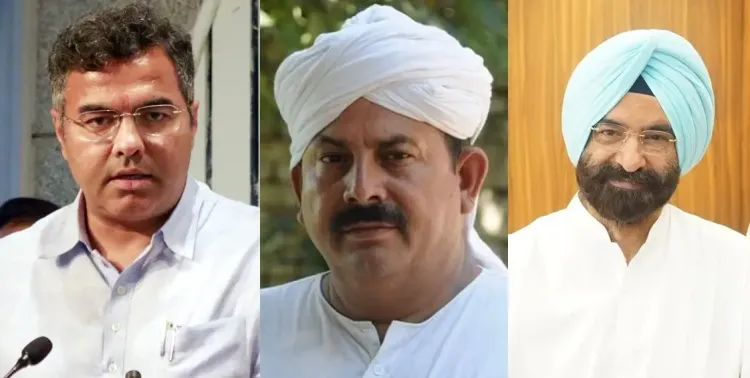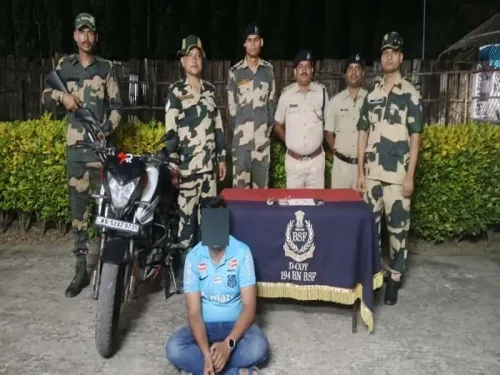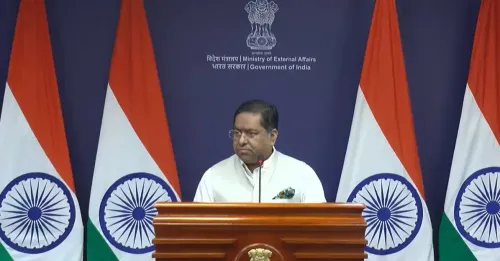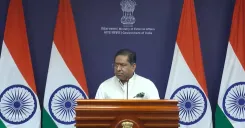What sparked the controversy over Naresh Tikait's stance on Pakistani farmers?

Synopsis
Key Takeaways
- Naresh Tikait's comments on Pakistani farmers have ignited controversy.
- Delhi Ministers condemned his remarks as anti-national.
- The Indus Waters Treaty is crucial in India-Pakistan relations.
- Nationalism plays a significant role in the ongoing debate.
- Political leaders emphasized the importance of prioritizing Indian farmers.
New Delhi, April 28 (NationPress) Farmer leader Naresh Tikait found himself under fire from Delhi Ministers Parvesh Verma and Manjinder Singh Sira for his perceived anti-national stance, expressing support for Pakistani farmers after India's decision to halt the Indus Waters Treaty.
“Naresh Tikait's remarks in favor of Pakistan insult the millions of farmers in our nation. This is disgraceful and anti-national,” asserted Verma, who identifies as a proud farmer and hails from the Jat community.
On Sunday, the National President of the Bhartiya Kisan Union criticized India's choice to stop the flow of Indus river water to Pakistan, arguing this action would adversely affect farmers in the neighboring nation.
He also stated that not all of Pakistan should be blamed for the Pahalgam attack, suggesting accountability should only fall on those responsible.
Verma reprimanded Tikait for opposing the Indian government’s move to suspend the treaty, emphasizing, “Farmers in India have always toiled in the fields for the honor of the tricolor and have given their lives to safeguard the country.”
Manjinder Singh Sira joined the criticism, labeling Tikait's actions as anti-national activities masked as trans-border farmer solidarity.
“Those who express concern for Pakistani farmers today are neither genuine citizens of India nor true advocates for Indian farmers,” he stated.
Verma accused Tikait of revealing the true nature of those who exploit politics for power and profit under the guise of patriotism and farmer leadership.
“If leaders like the Tikait brothers have such sympathy for Pakistan, perhaps they should relocate there,” he remarked.
The farmers of India are patriotic, dignified, and will not tolerate such treasonous comments. There is no room in India for those who speak against the nation, Verma asserted.
He affirmed that under Prime Minister Narendra Modi, India will safeguard its resources and rights, whether concerning water or borders.
“India’s rightful share of water is for Indian farmers, not for Pakistan, which promotes terrorism. Individuals like the Tikait brothers will find no support among Indian farmers,” he added.
Verma urged the remaining farmers supporting Tikait to abandon this anti-national mindset, as the public will soon respond decisively to such sentiments.
Sira also criticized Tikait, questioning, “Should we continue supplying water to those who wish to harm us?”
“Farmers in Punjab have publicly stated they desire revenge for the Pahalgam attack, even at the expense of their crops. This is genuine patriotism,” Sira concluded.
Earlier, Union Minister Hardeep Singh Puri dismissed assertions from Pakistani leaders and media regarding the severe repercussions of India's suspension of the Indus Waters Treaty of 1960.
“Nothing of that nature will occur… They will be brought to their knees,” he proclaimed, asserting there is nothing amiss about suspending a treaty between two sovereign nations.
“The circumstances in 1960 were different when the treaty was enacted… If one nation is attacked by another, should the latter continue to provide benefits?” he queried.









